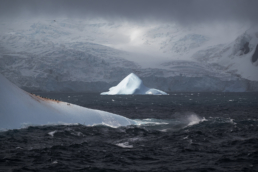April 28 – June 26, 2022
Opening reception: Thursday, April 28 2022 from 6 to 8 pm
Land Back: Levi Amidlak, Makusi Q. Angutigirk, Shuvigar Eelee, Elijassiapik, Tootaluk Etchuk, Maureen Gruben, Tutuyea Ikidluak, Nuveeya Ipellie, Mattuisi Iyaituk, Olajuk Kigutikardjuk, Ooloopie Killiktee, Jkai Lucassi, Barry Pottle, NIAP (Nancy Saunders), Camille Seaman, Lizzie Sheeg, Katherine Takpannie, Eva Aliktiluk Talooki, Therese P. Tugumiar
Curator: Michael Patten
Contemporary Native Art Biennial (BACA) – 6th edition
Musée des beaux-arts de Sherbrooke
241 Dufferin Street
Sherbrooke (QC) J1H 4M3
Free shuttle to Sherbrooke on April 28.
Departure from Montreal at 2:30 pm from gallery Art Mûr.
RSVP BACA
Since time immemorial, Indigenous peoples have preserved biodiversity in the face of continued human population growth. Shortly after the time of first contact with Europeans, Indigenous communities were stripped of their ancestral lands; the Land Back movement aims to restore governance and stewardship of the territory for a sustainable future.
If Land Back is a call to action, a return of equity to a stolen territory, it also allows for some questioning. How can we best protect biodiversity, land and water? The first step would be to return the land to its traditional and legitimate protectors. The revalorization of Indigenous knowledge goes beyond symbolic gestures of recognition or inclusion; it aims to significantly change practices and structures.
The Far North is a place that was greatly affected by colonialism. Heavily wounded by difficult geopolitics and the exponential growth of a capitalist Western world, the North suffers. Through poetic acts, artist Maureen Gruben attempts to heal this scar. Deeply rooted in the gesture of memory and nostalgia, she traces an iconography specific to Inuvialuit communities through the mediums of photography and film. A landscape in perpetual disfiguration, the North is the first witness of the pressing climatic crisis. The ice melting is a phenomenon widely documented by the photographer Camille Seaman, who proposes images, as sublime as they are melancholic, of icebergs drifting. Using the same strategies as for her portraits, the artist attempts to translate the similarity between humans and nature, while making the latter an agentic subject.
For Inuit communities, natural forces are often explained by a rich cosmology, which is part of their identity and transmitted knowledge. In her photographic series Sedna ᓴᓐᓇ, artist Katherine Takpannie explores the figure of Sedna: the goddess of the sea and the mother of all marine mammals. While her aesthetic is particularly colorful and fantastic, the soapstone sculptures in the collection of the Sherbrooke Museum of Fine Arts offer a more classical and sober reading of Inuit myths and legends.
It is on a more politically charged note that Barry Pottle approaches the Inuit condition. In an assumed archival gesture, he photographs old “Eskimo Identification Tags”. They are remnants of a program founded by the Canadian government in 1940, which aimed to regularize and “simplify” the naming of Inuit, who had only first names at the time. Above all, they remind us of a gesture that is heavily charged, both by its interference and by its quality of erasure.
We hope, through this exhibition, to open a window on the beauty and enchantment of the Great North while initiating a reflection on its past and present issues.
We recognize that BACA is taking place on unceded Indigenous lands, and that the Kanien’kehá:ka Nation is the caretaker of the lands and waters on which we gather today. Tiohtiá:ke (Montreal) is historically known as a gathering place for many First Nations. Today, it is home to a varied population of Indigenous and other peoples. BACA acknowledges the continued relations with the past, present, and future in their current relationships with Indigenous and other peoples within the Montreal community.
The Biennale d’art contemporain autochtone (BACA) thanks the Canada Council for the Arts, the Government of Québec (Conseil des arts et des lettres du Québec, Fonds d’investissement pour le rayonnement de la Métropole), Tourisme Montréal, the Conseil des arts de Montréal, the Sherbrooke Museum of Fine Arts and its other presenting partners.

